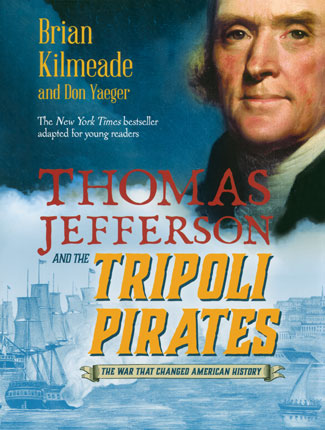| Thomas Jefferson and the Tripoli pirates : the war that changed American history Author: Kilmeade, Brian | ||
| Price: $6.50 | ||
Summary:
How Thomas Jefferson fought back against pirates from North Africa's Barbary coast who routinely captured American sailors and held them as slaves, demanding ransom and tribute payments far beyond what the new country could afford.
| Added Entry - Personal Name: | Yaeger, Don |
Reviews:
Kirkus Reviews (-) (01/15/20)
School Library Journal (02/01/20)
Booklist (03/15/20)
Full Text Reviews:
School Library Journal - 02/01/2020 Gr 7 Up—When Thomas Jefferson became president in 1801, the Barbary pirates had been preying on merchant ships sailing in the Mediterranean's international waters for centuries. Barbary pirates were from the North African countries of Morocco, Algiers, Tunis, and Tripoli. Nations (Great Britain and France) either had to pay exorbitant bribes or suffer the losses inflicted when the pirates raided their ships. In the 1790s, America made peace agreements with Morocco, Algiers, Tunis, and Tripoli that mandated paying the equivalent of one-eighth of the new government's annual expenditures to the Barbary pirate states. The treaties were signed against the advice of Jefferson, but he was able to convince George Washington and John Adams to continue building new ships to replace the ones that had gone out of service at the end of the Revolutionary War. The first three American ships were launched in 1797 and, by the time Jefferson was elected president in 1801, the Barbary states were already demanding increases in American tribute. American ships blockaded the harbor of Tripoli in an effort to avoid war, but, during a resupply errand, the USS Enterprise and the Tripoli clashed, with the American ship defeating the Tripolitan ship. This marked the end of American appeasement. Back matter includes a time line, sources, and an index. VERDICT A fast-paced young readers adaptation of the New York Times bestselling historical thriller. Recommended for students who like other works by Kilmeade, the history of the U.S. Navy, or factual accounts of piracy.—Susan Catlett, Green Run High School, Virginia Beach - Copyright 2020 Publishers Weekly, Library Journal and/or School Library Journal used with permission.
Booklist - 03/15/2020 This adaptation for young readers trims the original (2015) publication down considerably, resulting in a fast-paced piece of action-packed history capable of capturing any consenting middle-grade audience. As America transitioned into independence, the young nation’s vulnerability was exploited by the aggressive Barbary states, whose “pirates” began targeting American merchant vessels. This—specifically, the enslavement of American sailors—led the United States to raise a small navy and plunge into its first war. Despite the title, Jefferson plays a supporting role, with the bulk of the action taking place off the Barbary coast, following the exploits of a rotating cast of American sailors and diplomats in a play-by-play narrative broken into brisk chapters. The justification for war—liberating enslaved Americans—may rightly rankle readers, given that America’s own enslaved Africans receive no mention whatsoever, and the authors offer no commentary or context to address the hypocrisy. With this exciting but jarringly uncritical account of early U.S. history, educators should be ready to add context to the narrative. - Copyright 2020 Booklist.
Booklist - 03/15/2020 - Copyright 2020 Booklist.




